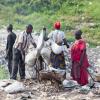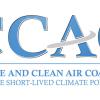News

05 June 2024
The 2024 State of CDR Report: Scaling up CO2 removal to meet Paris Targets
The 2024 State of Carbon Dioxide Removal report finds that around 7–9 billion tonnes of CO2 per year will need to be removed by mid-century from the atmosphere if the world is to meet the 1.5°C Paris Agreement target. The authors stress that reducing emissions is the primary way to achieve net-zero, but Carbon Dioxide Removal (CDR) has a critical role to play.

23 April 2024
US Permanent Representative to International Organizations in Vienna visits IIASA
H.E. Ambassador Laura Holgate, US Permanent Representative to International Organizations in Vienna, met with IIASA Director General John Schellnhuber to discuss advancing collaboration on leveraging systems analysis for the Sustainable Development Goals (SDGs). The visit strengthened ties between IIASA and the US, emphasizing a commitment to interdisciplinary collaboration and knowledge exchange for informed decision making.

15 April 2024
Collaborating to devise a strategy for organic waste management in Uganda
IIASA researchers are participating in a new project kicking off in Uganda this week, in which IIASA and a number of international partners will work with Ugandan stakeholders to co-develop a national strategy for organic waste management in the country.
Focus
27 June 2024
Improving national SDG reporting through citizen science
Working with IIASA researchers, Ghana pioneered the adoption of a citizen science approach to address the problem of plastic pollution in marine environments. Further analysis highlighted how a similar citizen science data validation and reporting process can benefit reporting on the Sustainable Development Goals (SDGs) in other countries.

27 June 2024
IIASA analysis underpins the European Commission’s 2040 climate target recommendation
IIASA researchers played a central role in the European Commission’s recommendation for the 2040 climate target, from delivering the scientific foundation and establishing dialogue with the community, to being among the renowned scientists selected as members of the European Scientific Advisory Board on Climate Change.

Impacts
19 August 2021
Water for growth
Impact Sheet #20, August 2021. IIASA and partners in East Africa are studying how the region’s economic development could affect water resources.

18 January 2021
Assessing biofuels for transport
Impact Sheet #18, January 2021. IIASA models feed into the biofuel policies of international aviation and the EU road transportation sector, helping to steer them towards cleaner feedstocks.

11 January 2021
Limiting global temperature increase to 1.5°C above pre-industrial levels
Impact Sheet #19, January 2021. IIASA research has guided the global policymaking community in their efforts to limit global temperature increase to this ambitious goal. When the world’s attention was focussed toward the 2°C target, the institute’s sophisticated analysis mapped credible pathways towards the 1.5°C goal

Policy briefs
09 April 2024
Forest science and education in Ukraine: Priorities for action
Ukraine’s forest sector is suffering unprecedented challenges. War has impacted both forests and forestry – devastating forest areas, infrastructure and industry, as well as causing ‘brain drain’ and capacity loss due to the disruption of research institutions and the displacement of students and scientists. These impacts are compounded by factors including climate change, unstable forest health dynamics, landscape fires, and an overall decrease in forest productivity.

04 October 2023
ENGAGE Summary for Policymakers
As the world faces the risks of dangerous climate change, policymakers, industry and civil society leaders are counting on Integrated Assessment Models (IAMs) to inform and guide strategies to deliver on the objectives of the Paris Agreement (PA) and subsequent agreements.

03 October 2023
Stakeholder engagement in climate change solutions
Policy Brief #42, October 2023. Workshops bringing scientists together with stakeholders from various backgrounds have shown the importance of dialogue for co-designing climate pathways and highlighted the need for physical meetings and capacity building.

Policy applications
22 February 2023
The Arctic Council
The Arctic has been warming at an alarming pace, double the global warming. Since 2008 AIR scientists have been involved in a number of activities associated with the Arctic, including contribution to the work of the Arctic Council Task Force on Short-Lived Climate Forcers, Arctic Monitoring and Assessment Programme (AMAP), The International Cryosphere Climate Initiative (ICCI).

22 February 2023
The Climate and Clean Air Coalition (CCAC)
In the '“Integrated Assessment of Black Carbon and Tropospheric Ozone” of UNEP and WMO, IIASA identified 16 practical measures that would improve human health, secure crop yields and, at the same time, reduce global temperature increase in the near-term by up to 0.5 degrees.
To initiate concrete action on these measures, US State Secretary Hillary Clinton launched a 'Climate and Clean Air Coalition to Reduce Short Lived Climate Pollutants' in February 2012, complementing efforts on CO2 emissions taken by countries under the UN Framework Convention on Climate Change. By early 2018, the Coalition was joined by more than 50 countries and more than 60 non-state partners.

22 February 2023
Task Force on Integrated Assessment Modelling (TFIAM) under the LRTAP Convention
The Task Force’s main focus is to combine information produced by the various scientific working groups of the LRTAP Convention and through computer models assist in the development of legal instruments.
